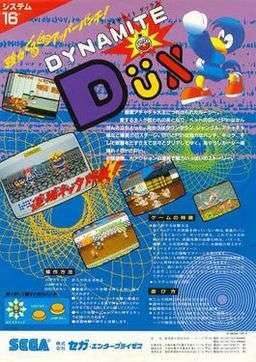Dynamite Düx
| Dynamite Düx | |
|---|---|
|
Japanese arcade flyer of Dynamite Düx | |
| Developer(s) | Sega AM2 |
| Publisher(s) | Sega |
| Producer(s) | Yu Suzuki[1] |
| Composer(s) | Hiroshi Kawaguchi |
| Platform(s) | Arcade, Amiga, Amstrad CPC, Atari ST, Commodore 64, Master System, ZX Spectrum |
| Release |
|
| Genre(s) | Beat 'em up |
| Mode(s) | Single-player, two-player |
| Cabinet | Upright |
| Arcade system | Sega System 16 |
| CPU | Motorola 68000 clocked at 10MHz, Zilog Z80 clocked at 5MHz |
| Sound | YM2151 clocked at 4MHz, UPD7759 clocked at 0.64MHz |
| Display | Raster, 320 x 224, horizontal orientation |
Dynamite Düx is a side-scrolling 'beat 'em up' arcade video game, created by Sega AM2 and released by Sega in 1988 for their successful Sega System 16 arcade board, the same board that was used for hits like Golden Axe and Altered Beast. It was ported to the Amiga, Amstrad CPC, Atari ST, Commodore 64, Sega Master System and ZX Spectrum in the following year.
A girl named Lucy is kidnapped by the evil Sorcerer Achacha, and the player's mission is to rescue her.
Gameplay
The player controls one of two bow-tie wearing cartoon ducks named Bin (blue) and Pin (red). They are Lucy's pets, and must travel through six stages set in real locations, though everything else in the game is very cartoonish, reminiscent of Tex Avery. Two players can play at once, Bin is by default player one's character, Pin player two's. Each level ends with a boss battle. After stages 2 and 4 there is a bonus round where the two ducks box until time runs out, the player with the most health will win and receive 50000 points.
Dynamite Düx uses only two buttons: the jump button (which is self-explanatory) and the attack button. The attack button allows you to use the Punch Glove or throw enemies in a manner in like a cartoon. The attack button can also let you pick up and use numerous weapons including: rocks, bazookas and the game's signature weapon, bombs (hence the title). Unlike some of its contemporary side-scrollers, Dynamite Düx allows players to attack in all directions, including diagonally.
The game measures health unusually in that it uses a status bar located at the bottom of the screen. A players status is made up of bars of health that are color-coded blue, yellow and red, which deplete when damage is taken. Along with a varied set of enemies (all oddball cartoon-like characters) each level has a number of other obstacles that can inflict damage on the player(s).
There are three types of power ups: Food (replenishes health), weapons (all weapons will eventually 'expire' when their ammo depletes) and treasure chests (give the player(s) extra points or weapons).
Master System port
The game was ported to the Sega Master System in 1989. Both the graphics and sound are noticeably inferior to the arcade original, which ran on the much more powerful System-16 board. The sprites are much smaller and different, with many of the characters having noticeably fewer frames of animation. Many of the enemies' unique dying animations were cut or altered. There are fewer weapons and power-ups per level as well as fewer enemies per level.
The story has also been altered. Instead of being her pet, Bin (Pin does not appear) is Mickael, Lucy's boyfriend. Mickael has been transformed into Bin the duck by Achacha (similar to Toki).
Bean The Dynamite
Bean the Dynamite was created by AM2 for Sonic the Fighters, a Sonic The Hedgehog fighting game, released initially for arcades in 1995 (it was given a limited US release as Sonic Championship) and finally ported to home console in 2005 as part of Sega's Sonic Gems Collection compilation; Bean is based solely on the characters Bin and Pin from Dynamite Düx (though he wears a neckerchief instead of a bow-tie and Sonic's shoes instead of regular sneakers).
Bean also appeared in Sega AM2's Sega Saturn fighting game Fighters Megamix as a bonus unlockable character (along with Bark The Polarbear.) He is unlocked by completing the fourth arcade mode 'Muscle' and fought against in the final arcade mode 'Bonus'. He also appears as a character in the Sonic the Hedgehog comics from the Archie Comics company, which have made some allusions to Bin and Pin as being connected to him and a group of birds from the game Tails Adventure.
Reception
Sinclair User reviewed the arcade game in its November 1988 issue and gave it a rating of 9 out of 10, describing it as an entertaining pseudo-3D scroller with "a surreal sense of the ridiculous."[2] The January 1989 issue of Sinclair User gave it the 1988 award for Most Original Game of the Year.[3]
References
External links
- MAQUINITAS: Dynamite Dux Master System
- Dynamite Düx at the Killer List of Videogames
- Dynamite Düx at SpectrumComputing.co.uk
- Dynamite Düx at MobyGames
